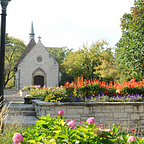Global Jesuits open up about possibility: Jim Pribek, S. J.
Mission Week Feature Series
What is your international ministry experience? How long did you spend there?
I lived in Ireland continuously for five years and I returned for several summers. I also worked in a diocesan parish when I was there, which was a rewarding experience completely apart from the university or the Jesuit context. It allowed me to meet a wider array of folks. Ultimately, I left in 2004.
What is your Marquette ministry focus?
I work in the Mission and Ministry office, which oversees and plans many religious and spiritual activities on campus. I also teach a course every semester in the English department.
Most impactful or memorable experience abroad?
I suppose the university component had the most lasting impact on my life. The way that it formed me for my subsequent ministry was invaluable. I wasn’t just teaching students: I also studied alongside them and other international students. Both the masters and the doctoral students were among the most diverse groups I have ever been associated with. There were Irish people in both groups, but most of us doing those degrees at University College Dublin at the time were not Irish. Not only did I absorb a lot of Irish history, culture and art, but I like to think I picked up a lot from my international peers in the graduate programs too. Those studies taught me to look at the culture sympathetically and with an open mind, but also with an eye to its limitations and its potential conflicts and inadequacies.
How did your time working internationally change your approach to your ministry and its possibilities? How have you implemented those changes at Marquette?
For one thing, it showed me that Jesuit ministry, though broadly educational, is much more than schools and universities. I would tell my Irish Jesuit confreres that I perceived their province to be more communications oriented. For instance, they created a lot of programs that were offered for free to Irish radio stations. At the time, their “Sacred Space” prayer website was also gaining a worldwide following. Such projects changed my notion that we Jesuits are primarily high school and university teachers, because while they still had a good few people in education, particularly in the high schools, the prominence of Jesuits in communications work there was remarkable. Worldwide, we tailor our educational ministries to the people’s needs.
My understanding of the Irish mind is that it revels in possibility, and I found that refreshing. There is a certain radical streak of Irish thinking that delights in destroying established ways of thought or dichotomies. That strain of Irish thinking was very good for me. My studies and experiences in Ireland challenged me to be flexible and to think of different ways to solve problems or help students, realizing that there is more than one or two possibilities in most cases. That radical impulse or general freedom around thinking or ways of proceeding have definitely impacted me as a teacher. I’m very open to alternative assignments for students who have different learning styles or ways of processing material.
How does your international experience inform you of the Jesuit mission?
It goes deep in the Jesuit mind and heart to think of the whole world rather than one particular group, nation or culture. We have a contemplation in the Spiritual Exercises where we join the Trinity in looking at the world in all its diversity. We imagine concretely the people, the languages, the joys, the sufferings, the incredible richness and variety of the globe. That goes very deep into the Jesuit psyche. Thinking globally involves not just missions to accomplish or objectives to realize: it’s something that moves us deeply. Things international are matters of the mind for us, but also matters of the heart. Ignatius thought in terms of the globe and the cosmos and was moved by stargazing. Even though we try to immerse ourselves in the concrete and particular, at the same time, there’s a side of our thinking and our ministry that is universal and even cosmic. Every single day we focus on the community we’ve been sent to and give ourselves to it; but at the same time we’re very moved by and dedicated to all of God’s creation. I think my international time has helped me in both regards: to embrace the people and the situations in front of me every day and to realize God’s creation is bigger than I can ever perceive. I think I would be a very limited disciple and servant if I was only moved by what was in front of me every day.
